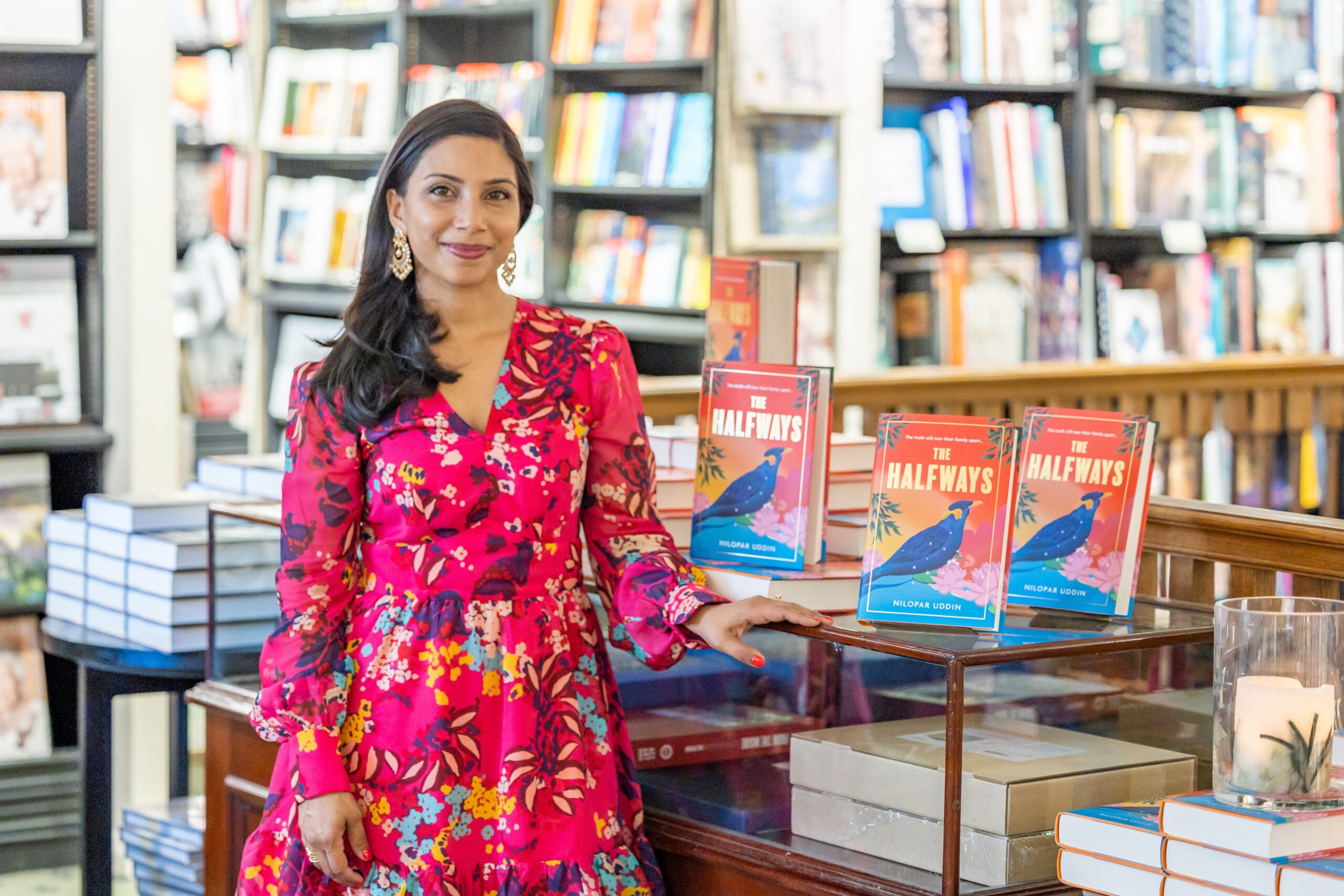Nilopar Uddin, author of The Halfways, writes about her inspiration for her enchanting debut novel. Moving between London, Wales, New York and Bangladesh, The Halfways is an epic family drama that spans over four decades. A story of mothers and daughters, of fathers and daughters, of sisterhood, it explores belonging, family and what makes forgiveness and redemption possible.
I have always loved big family sagas and stories centred around family, so it was only natural that when I came to writing my first novel, I would turn to family as my subject. Families are microcosms of society and creating a wide cast of characters living in three different countries but who are tied together by family connection, gave me the freedom to navigate the gulfs between generations and the disparities between values, cultures and lifestyles.
The novel follows multiple generations of the Islam family who own an Indian restaurant in the Brecon Beacons. There is Nasrin, the stay-at-home mum who feels perpetually displaced and discontented; there is the fiercely ambitious Sabrina who is determined to scale the heights of the banking world at all costs; and then there is their cousin, Afroz who is miscast as a subservient, Bangladeshi housewife. When Nasrin and Sabrina’s father passes away, they return to the Beacons to join their mother and cousin Afroz, where they are confronted with a devastating secret that had been buried for decades. The story traces the journey of each of these women as they try to navigate the fallout from the disclosure of this secret, before a tragedy occurs that changes their lives forever.
The Halfways is a big family story, but one which is complicated by the pull of another homeland: Bangladesh. Being a daughter of first-generation immigrants from Bangladesh, it felt important to me to tell this story. Representation is important and I wanted to foster an understanding of the Sylheti Bangladeshi community in Britain, their food, their language and their customs.
I drew on my experiences as part of the Bangladeshi diaspora living between two cultures to write the novel. The Indian restaurant which is the focal point of the story is inspired by my father’s restaurant and I also have experience of many of the places described in the novel: I spent many childhood summers in Bangladesh, and I have lived in both London and New York. The raw material of my own experiences and memories have been transformed in the writing process to create this work of fiction. However, the issues I have explored, such as the themes of family and belonging, are ones which have been important to me growing up in rural Shropshire as a member of the Sylheti diaspora.
The idea of family is intertwined with the importance of story in The Halfways. Elias’s sense of wellbeing is bolstered by his understanding of his family story and how he fits into it. As he says in the opening pages of the book: “each story has helped light his path: each bit of history a beam in a flood of darkness, revealing to him something of life’s circularity, of its inherent wisdom and simplicity. Their stories are the bones of his being.” The Halfways is essentially a family history narrated for Elias using the multiple perspectives of the women who had “mothered” him. But it also charts the struggles of each of the other members of the Islam family – the banker, the ex-pilot, the housewife, the restauranter and the chef, who attempt to find their place in the world. They too must understand their family story before they can make the transformative journey of understanding who they are. Each character has his or her own story but it is a story that can only be fully understood within the context of their family history.
The novel also explores family expectations and the role of cultural, traditional and religious values in a person’s life. How do such family members who have been bought up in different parts of the world and under different value systems, find commonality? How can first generation immigrants reach out to their children and grandchildren and bridge the divides caused by the differences in their experiences, and how do the younger generations arrive at some understanding of the struggles that bought their parents to leave behind all that they loved? These are the questions that the members of the Islam family grapple with, as they each make their own way in the world.
Belonging is another important theme which also connects with the theme of family. There is deep emotion to be found in the pull of another homeland, allowing for an exploration of all manner of complexities: the tangled roots of heritage and legacy; how traumas can be inherited over generations and cause tragedies in unforeseen ways; and how time and distance may not lessen such traumas, but can instead complicate them. While all families have secrets that get buried, the Islam family have secrets that had been left behind, making it even harder to discover their history.
The novel explores the Bangladeshi immigrant experience by looking at it from the multiple perspectives of the family members – depicting both the potential for tragedy in the diaspora life – that feeling that nowhere is quite home and the nostalgia for a place long left behind – but also how wonderful and uplifting migration can be, and how the courage to embrace new places can be a source of joy and aspiration. The immigration story is such a powerful and timeless one. People always move, seeking all variety of freedoms: but they also yearn for a sense of belonging in the new places they call home.
The Halfways is a love letter to the idea of family and all the power it holds to be a stabilizing pillar, particularly for those whose lives are complicated and enriched by the tensions and divided loyalties caused by attachments to another homeland. It is an exploration of how important understanding family is and how a positively framed, shared story can strengthen family bonds by helping to shape a collective identity.
The Halfways is out now in hardback and eBook.





